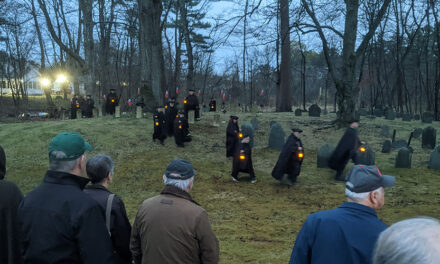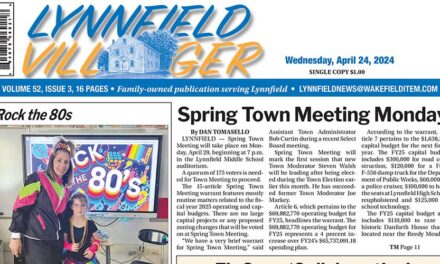By MAUREEN DOHERTY
LYNNFIELD — A preliminary overview of the town’s FY16 budget projections reveals that total revenues could increase by over $3 million from the current FY15 budget, topping $50,271,000.
This potential increase of 6.86 percent was attributed to many factors currently trending in the town’s favor, Town Administrator Bill Gustus explained during the annual budget summit with the town’s department heads and various elected and appointed committees last week.
The summit is held on the first Wednesday night of December to kick off the four-month budget preparation season that will culminate at the annual Town Meeting on Monday, April 27.
It also marked the last such summit for Gustus, who will retire on Jan. 9 and hand over the reins to incoming Town Administrator James Boudreau, now performing that job in Norwell.
“Most financial flexibility”
FY16 will bring with it the most “financial flexibility” the town has ever had during his tenure, Gustus said due to “new growth revenues” that exceeded the town’s expectations, mainly due to MarketStreet as well as some smaller developments. New growth was estimated at a conservative level over the past few years to ensure that a budget deficit was not created if it missed its projected mark, he said.
Selectmen Chairman Dave Nelson praised the town’s employees as well as the elected and appointed volunteers for enabling the town to weather through some difficult financial times in recent years due to their creative approaches to their budgets.
Calling them “dedicated professionals,” Nelson added, “Lynnfield’s economy is very good and I think it is because of everyone in this room.” Nelson also gave credit to Gustus for applying his creative touch in contributing to the town’s financial success.
Nelson predicted that the town will enjoy one or two more years of significant new growth, mostly due to the build-out of MarketStreet, but emphasized this new growth is a “one-time deal” and it will then “calm down,” therefore a “conservative” approach to budgeting remains important.
Addressing underfunded needs
Gustus stressed that this year’s financial flexibility provides an opportunity for the town to address underfunded areas of the budget from the past several years and help the town get ahead of the curve in areas such as road repairs and maintenance, capital facilities improvements, equipment upgrades and increased revenues for the stabilization fund.
“With that new growth also comes new responsibilities to do things we have not been able to do over the course of the last five to seven years as we struggled through the recessions and then got back on our feet,” Gustus explained.
Therefore, his starting point in the FY16 budget meets all of the town’s contractual obligations, provides for expected increases in pensions, insurance and utilities, including new facilities (fields, Centre Farm), and nearly doubles the amount of funds dedicated to capital expenditures (from $629,000 to $1.2M). It also utilizes both town and state funding sources to earmark over $1M toward road maintenance, repairs and replacement.
The only new employee positions being considered by the administration would be in the Police Department to alleviate the strain of increased demand for services that was also anticipated with MarketStreet and other developments coming on line.
“Our base revenue will increase from $34,469,374 up to $38,147,208. The components of that are the prior year levy limit of $36,436,301 plus $910,907 for the 2 1/2 percent increase and an initial estimate of new growth for next year of $800,000. Total property taxes – except for the debt exclusion – will be $38,147,000,” Gustus said.
He is projecting level-funded state aid, though he admits that might be “optimistic” because of a $325,000,000 gap in the state budget. “But it doesn’t make sense to react to those numbers as we are at least six to 18 months away from what is likely to happen in fiscal ‘16,” Gustus explained.
The town’s debt will also decline by about $57,000 due to a decrease in interest costs “associated with our balance on our school debt and other debt-excluded debt,” he said.
Local receipts are also expected to increase by $404,000, he said, or over 11 percent. “This number is based upon actual receipts that we took in for the fiscal year that ended last June,” Gustus said.
Other revenue sources include: $20,000 from the cemetery trust fund, $30,000 from the fund to repay the septic debt out of the proceeds of mortgages taken out by homeowners who used state money to replace or repair their septic systems, and a $990 contribution from the American Legion fund put toward veterans activities for a total revenue of $50,271,318, he said.
Gustus said it was worth noting that “we have not committed one dollar of free cash to the funding plan for the next year. This will be the first time we’ve ever been able to do that since I’ve been here, and our free cash currently stands at over $1.1M. We used a little bit at the fall Town Meeting, but it is still over one million in free cash, which is just another reserve fund available to us.”
Committed to roads
Gustus said the preliminary budget continues the town’s commitment to increased funding for road repairs.
Over the past two fiscal years, the town added $75,000 per year to the DPW budget to supplement state Chap. 90 funds. This year’s budget increases that commitment to $150,000 to bring the annual funds dedicated to road repairs to over $1M, which he said was “long overdue and one of the areas the Board of Selectmen has stressed, even in not so robust budget years, given the condition of a lot of our roads.”
Gustus added that incoming Gov. Charlie Baker has stated his support for the release of extra Chap. 90 funds. “If that actually happens and (the Legislature) at least level-fund that next year, we will finally be in a position where our funding for roads – maintenance, replacement, repair – will be enough to actually replace all the roads before it’s time to start over again, and we’ve never been able to say that,” he said.
Capital expenses to double
Gustus has also proposed nearly doubling the town’s capital expense budget, to $1.2M, to replace capital equipment, such as technology upgrades for the schools, heavy equipment for the DPW and facility repairs “that are long overdue.” He hopes such investments will “get us to a point where we can commit each and every year a reasonable amount of our overall tax levy toward capital replacement of equipment.”
Gustus also proposed doubling the funds added to both the stabilization fund and the capital facilities maintenance fund, from $150,000 to $300,000.
“The proposal would be to spend over $2.3M on these other expenditures, up from $1.4M in the current fiscal budget,” he said.
FY16 budget calendar
The town’s calendar for establishing the FY16 budget has been set from now through Monday, April 27. At last Wednesday’s summit, all department heads were informed that their departmental budgets are due on Monday, Dec. 29 and they must be entered into the MUNIS system by a trained member of their department (smaller departments, such as the Historical Commission, Finance Committee and animal control officer are allowed to prepare their budgets manually).
This deadline gives Gustus and Town Accountant Julie McCarthy about a week to review these figures prior to submitting each department’s budget to the Finance Committee on Wednesday, Jan. 7. This also coincides with the final week of Gustus’s tenure as he is set to retire on Jan. 9 after 12 years as town administrator.
Subsequently, each department’s capital budgets are due to be submitted on Friday, Jan. 16. These budgets will be reviewed by the new Town Administrator, James Boudreau, and McCarthy, and then provided to the Finance Committee on Wednesday, Jan. 21.
The School Department’s placeholder budget is due to be submitted to the town on Friday, Jan. 30.
The Board of Selectmen will hold four public budget sessions during their regular twice monthly Monday night meeting cycle on Jan. 5, Jan. 26, Feb. 9 and Feb. 23. Various department heads will present their budgets at these meetings and justify their requests.
At the Feb. 9 Selectmen’s meeting, the town administrator will also present his recommended budget, which will include a capital plan, to the Board of Selectmen.
At their Monday, March 9 meeting, the Board of Selectmen will vote on their final recommended budget.
Throughout this process, the Finance Committee will also meet with specific department heads, boards and commissions at its public meetings to formulate its recommendations. The FinCom will hold its public budget hearing and issue its final recommendations on the entire town and school budget on Monday, March 23 prior to the printing of the annual Town Meeting warrant.
Town Meeting will be held on Monday, April 27 in the auditorium at Lynnfield Middle School at 7:30 p.m.
Budget preparations
The department heads, boards and commissions were given parameters by Gustus that will generally not allow for new positions, with the likely exception of the Police Department, but any such requests will be reviewed on a case-by-case basis.
Modest increased funding for department expenses is also expected whenever possible. Salaries in FY16 will be based on 262 working days due to Leap Year in 2016. All union salaries are to be based on the approved union contracts while non-union salaries are to be level-funded pending a determination by the Board of Selectmen on what salary levels will be for FY16.
The department heads involved in the summit included DPW, Schools, Police and Fire, Library, Council on Aging, Recreation, boards and commissions, such as the Planning Board and Conservation Commission, and regulatory departments such as the Board of Health.




